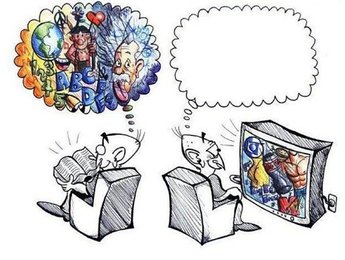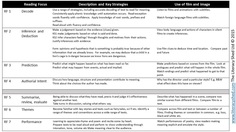|
This is the 3rd in a series of blog about reading. I strongly believe that the use of film can improve reading skills. It breaks down some of the barriers to reading. The three main barriers, shown in the previous blog here, are; confidence, motivation and ability. Film attacks these barriers in a number of ways. It overcomes the problem of motivation because films are often more engaging to many children than books, there are a plethora of reasons why this may or may not be the case. Almost all children have a wide experience of film and TV, they become 'experts' in following plot, analysing characters and predicting events, often unconsciously. This expertise allows them to answer questions about film confidently. Film is accessible to all students regardless of ability, even children who are unable to decode are able to view films and form ideas and hypotheses about them. I am not advocating that film be used instead of books to teach children to read, but for the reasons described above I think that they are a very useful tool for teachers.
Books are wonderful learning tools but are inaccessible to some children. The UKLA report that one in ten children: do not have any book to call their own; have never been to a library; have never visited a book shop by the time they leave KS2. Below are some ideas for using film in the classroom to practice reading skills. The reading skills are taken from The Literacy Shed Reading Skills grid which can be downloaded by clicking the image. RF1: DecodeThere is no real substitute for reading texts to teach decoding, using a step by step phonics programme and for older students who may be low ability use of reading interventions. However, film can allow younger children to develop a wider vocabulary, so that new words are not always unfamiliar. Film with subtitles allows children to practice their reading skills, it also encourages reluctant readers to read. If for example, a foreign language film is used children will have to read the subtitles in order to understand plot and dialogue. This example is from 'Replay' which can be found on Literacy Shed here.
RF2: Inference and DeductionInference is the skill of reading the text for clues and forming a judgement. KS1 make judgements based on what is said and done. KS2 infer characters feelings’ through thoughts and motives from their actions. Children justify inferences with evidence from the text. Children who are poor decoders focus so much on the decoding that the meaning of what they are reading can become lost. Poorer readers find it difficult to read beyond the literal. Film takes away the barrier of decoding and allows children to focus on the body language. If you ask children 'How does the Lighthouse Keeper feel about his neighbours after watching this clip. Most children offer answers such as: he is annoyed with them, he doesn't like them, he thinks they are noisy, he is jealous that they are all having a good time. When we ask the children to justify their answers they talk about him 'muttering under his breath' about them and slamming the window, either in frustration or to keep the noise out. Children can use their deduction skills to deduce that the Lighthouse Keeper is lonely. They use the prior knowledge of light house keepers along with this clip to deduce that he lives by himself, he is jealous of his neighbours and slams the window out of frustration. RF3: PredictionMake predictions based on scenes from the film. Look at prologues and predict what will happen in the whole film. Watch endings and predict what happened to get to that point. Watch events and discuss how these events will affect the plot.
At the point when he begins to crack the eggs, the children can predict what comes out. There are other points in the film which are great for prediction too. The Next one.... Click here to view part 2The next blog will look at the following:
4 Comments
4/1/2016 10:39:53 pm
I agree - not that I didn't before!
Reply
I love reading and hugely believe all children can become lovers of reading too but it doesn't necessarily have to be through books.
Reply
Stella
19/11/2021 12:27:01 pm
Thank you so much for this blog. I'm a student teacher and was not sure about using film for my guided reading planning next week. This has completely reassured and inspired me.
Reply
Leave a Reply. |
Archives
July 2020
Categories
All
|


 RSS Feed
RSS Feed
